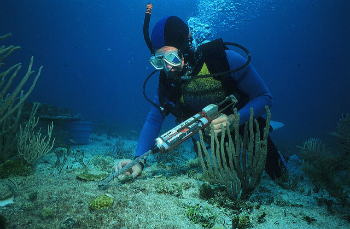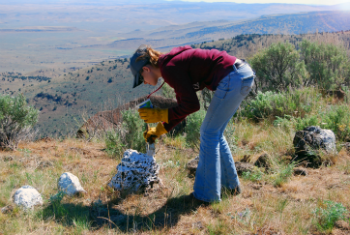Employers and Universities: Work with us?

Where can environmental science take me?
How are humans affecting the earth’s temperature? What effect is climate change really having on our coastlines? What causes volcanoes? What alternative energy sources should we be using?
If these questions intrigue you, you might want to think about studying environmental science. So what can you do with an environmental studies degree? Well, there are plenty of environmental science jobs out there, from studying sea life to designing environmentally-friendly technology.
It’s a challenging and rewarding career where you stand to make a real difference – plus, there are plenty of job opportunities for environmental science graduates.
So in this guide, we’ll explore:
- What do you study in environmental science?
- What skills will you gain?
- What jobs can you get with an environmental science degree?
- How to be an environmental scientist.
'If you care about the planet, environmental science can open up lots of cool career paths'
What do you study in environmental science?

biology
To kick things off we’ll take a look at what’s involved in environmental studies. During your environmental science degree you’ll learn about the biological and chemical make-up of the natural world, and the impact that we humans have on it.
Courses in environmental science include geology, geophysics, countryside conservation, volcanology, climate science, meteorology, oceanography and ecology.
Here you can view the university rankings for courses in environmental science. You’ll usually need three science A-levels for environmental studies.
What skills will you gain?
Field work is an important part of many courses, so you’ll gain practical hands-on skills as well as observational and research skills. You’ll know how to analyse and interpret data.
You’ll pick up lots of transferable skills, including verbal and written communication, project management and teamworking. You may also develop creativity to come up with different research models. You’ll improve your presentation skills when you display your findings.
What jobs can you get with an environmental science degree?
The job opportunities for environmental science graduates tend to be good but your starting salary will not be high. There is a range of organisations looking to hire environmental science graduates, including:
- The government.
- The armed forces.
- Environmental campaigning groups.
- Energy companies.
- Environment Agency.
- Department for Environment, Food and Rural Affairs.
- Charities.
Learn more about environmental science careers:
Here we’ll look at some of the main jobs linked to environmental studies.
Environmental scientist
One of the core environmental science jobs, environmental scientists study the effects of human activities on the environment. They carry out research and interpret data – with the end goal of preventing and solving environmental problems. For example they might explore ways to lessen air pollution and its negative effects.
Tasks might include doing lab tests on water, air and soil samples, and communicating results to senior management and other colleagues.
When it comes to how to be an environmental scientist, you’ll need an inquiring mind and a very good ability to solve problems. You’ll be a sharp observer with a critical outlook.
You will need a degree in environmental science, environmental engineering or environmental bioscience. As a very approximate guide, environmental scientists earn an average salary of £33,635.
Environmental consultant
Environmental consultants give expert advice to different organisations on a different environmental issues. For example they might advise on whether what environmental impacts a new building project might have. They look at opportunities to use renewable energy and recycle.
Most environmental consultants work for “consultancy companies” – which are in turn hired by different companies, organisations or local government.
Graduate starting salaries are around £23,000. Senior consultants can expect to earn up to £44,000.
Environmental manager
Environmental managers (sometimes called sustainability managers) are employed by different companies and organisations to make sure they’re operating in an environmentally-friendly way. They make sure companies are playing by the rules (ie environmental laws) and come up with strategies for where improvements can be made.
You’d need to have excellent communication skills and good leadership skills. Adaptability skills are also key. Graduates in this role can expect a salary of around £22,000, while the average salary for Institute of Environmental Management and Assessment (IEMA) members is £38,180.
Conservation officer

for negotiating are important for the role of conservation officer.
Conservation officers protect and improve the rural environment.
Their tasks could include advising landowners on how to manage their land, making sure the public can access the countryside, and making sure parks and forests are maintained.
Ecologist
Ecologists study the relationship between animals, plants and the environment. They typically specialise in a type of environment, like coastal areas, or a kind of animal or plant. Ecologists carry out research in the field, working with animals or observing plants, then recording their findings. They look at how humans affect the environment and keep track of pollution.
Important note! You don’t actually need a degree to become an ecologist or a conservation officer, you can do an apprenticeship instead. You’ll learn on the job, earning a salary and gaining a professional qualification. Learn more about environmental conservation apprenticeships here.
What can you do with an environmental studies degree?
There are other roles you can pursue after studying environmental science. Careers in environmental health, waste management, agriculture, town planning, teaching and scientific research are also open to you.
Intrigued? Read this for lots more cool environmental jobs and learn more about the different routes into the Environment Agency.
You might also like...
Jobs in space that are out of this world
Image credits
Marine biologist by NOAA via Flickr; conservation officer via Wikimedia
